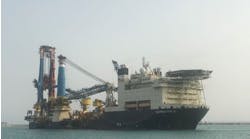Editor's note: This article first appeared in the 2024 Offshore Business Strategies Special Report, which published within the May/June 2024 issue of Offshore magazine.
By David Thompson, RMI
While the industry has made great strides in addressing the mental health challenges workers can experience offshore, the culture of silence across vessels around the world is still prevalent. Common mental health issues such as reports of high stress, anxiety and depression in offshore workers have increased in recorded instances recently. The International Association of Drilling Contractors (IADC) highlighted that 60% of employees faced mental health challenges at some point in their lives. This leaves organizations and operators facing challenges of absenteeism and illness, as the World Health Organization estimates that 12 billion working days are lost every year to depression and anxiety.
Sometimes the simplest solutions are often the most effective in tackling and preventing mental health issues arising among workers in offshore environments. Offshore workers operate in highly controlled and challenging environments where they are spending time away from family and are in confined spaces while working long and demanding shift patterns. To combat this, medics should promote simple practices of self-care, optimal sleep hygiene and rest, a varied and wholesome diet, regular exercise, and avoid excessive phone use in between shifts to communities of workers. Mental health webinars and surveys, informal workshops and awareness-raising education campaigns should also be made available, ensuring the wellbeing of offshore workers is never neglected.
Bespoke solutions offshore
RMI has been providing medical support services to the offshore industry for 20 years, and mental health care is a core element of its provision. RMI is one of many organizations to sign up to the IADC's Mental Health and Wellbeing Charter, North Sea Chapter. The charter aims to foster and drive cultural change in how the energy sector approaches mental health among the workforce. Signatories are committed to encouraging employers to consider mental health to be as important as physical health in the workplace and promoting solutions to taking care of workers mental health and wellbeing.
Every offshore workplace is different, whether it is the location, weather or the cultural makeup of the employees, and medics need to be specialized and adaptable to the workforce they are part of. One of the biggest mistakes that operators can make is to try to introduce a one-size-fits-all approach to mental health that does not offer adequate support to its workers. RMI’s medical provision enables medics to continuously improve their service as they integrate and get to know the crew and their patients. Medics are able to work with their worker teams to identify new avenues of support to produce bespoke solutions that fit the needs and requirements of each individual.
This tailored approach incorporates routine check-ups, one-to-one sessions and opportunities where workers are encouraged to open up to the medical professional, as well as access to 24/7 support. Medics also need to focus on the most pressing and recurring issues facing offshore workers and look to implement preventative mental health measures to tackle concerns before they become an issue. In the event an issue arises that an onboard medic cannot tackle in isolation, they can access a wealth of support by referring patients to topside doctors, anonymous support services or to company support schemes. Practitioners can also offer workers access to tele-psychology services if needed to set up a consultation with a psychologist.
Normalizing mental health talks
Many workers across the industry struggle to open up about their mental health challenges due to concerns about sharing weaknesses or that they could become more vulnerable to losing their job. The presence of medics promoting good mental health and wellbeing practices and providing support for mental health challenges can help normalize discussions and reduce the stigma around the issues.
By interacting regularly and building trusted relationships with workers, onsite medics become a highly valued member of the offshore team, and this is a great first step in changing the cultures across offshore operations. While it may take some years to shift the cultural outlook of the industry, there is a greater chance of achieving this goal with more provisions and focus on mental health offshore. This will not only result in a healthier and happier workforce but in a sustainable business, setting an example for the rest of the industry.




